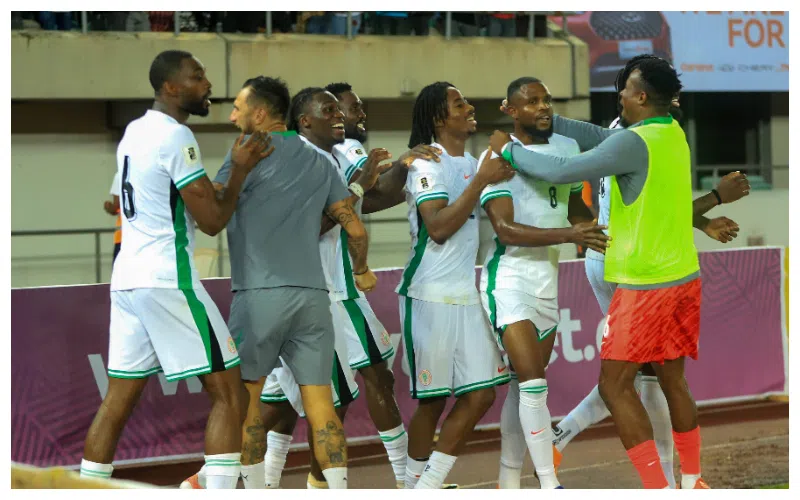The roar that followed Nigeria’s emphatic clincher against Benin was more than celebration, it was a deep exhale from a nation that had flirted with disappointment before landing on solid ground. In the heart of that release sits the story of the Super Eagles World Cup Playoff Qualification, a hard-earned ticket that has already reshaped schedules, sharpened priorities, and reignited belief ahead of a November showdown in Morocco.
From brink to belief Nigeria turn pressure into momentum
Nigeria’s path here was anything but straightforward. A poor start left the Super Eagles battling from third place, behind Benin Republic and South Africa, with the margins so tight that one slip might have ended the dream. Pressure, in football, can suffocate, yet sometimes it clarifies purpose.
That purpose burst into life in Uyo, where the Super Eagles defeated Benin Republic 4-0 at the Godwin Akpabio Stadium. The scoreline felt like a statement, a line in the sand that separated worried chatter from renewed conviction. It offered a surge of momentum, and with it, a sense that Nigeria’s campaign had not only been salvaged, it had found a new rhythm.
Why the NFF pulled the plug on US friendlies
The Nigeria Football Federation moved decisively once qualification for the playoffs was secured. Two international friendlies planned in the United States, against Venezuela on November 14 and Colombia on November 18, were officially cancelled. The reason was straightforward, the playoffs in Morocco were set for the same window, and the federation wanted the Super Eagles fully focused on the task ahead.
The explanation from within the federation was clear and pragmatic. Scheduling, not sentiment, drove the decision, and the agreements made room for that reality in the event of a playoff push.
“The friendlies have been called off because the date clashed with the World Cup playoffs slated for Morocco in November,” an NFF official confirmed. “Besides, the clause in the friendlies allows for cancellation should the Super Eagles qualify for the 2026 World Cup.”
The cancellations underline the stakes. Travel logistics, different time zones, and the intensity of transcontinental friendlies rarely make for ideal playoff preparation. By clearing the deck, the NFF sent a message that everything now orbits the playoff campaign in Morocco.
The playoff path in Morocco dates to circle
Nigeria’s immediate assignment is clear. The Super Eagles will face Gabon in the World Cup playoff semi-final on November 13 in Morocco. Should they navigate that hurdle, the final of the playoff tournament is scheduled for November 16, also in Morocco.
There is no room for drift in a two-game sprint. Every minute matters, and every choice, from selection to in-game adjustments, will carry weight. The runway is short, which is precisely why the window once earmarked for friendlies has been reclaimed for targeted preparation.
Respect from the continent what rivals say about Nigeria
Recognition has arrived from beyond Nigeria’s borders, and it carries substance. Zimbabwe’s head coach, Michael Nees, placed Nigeria and Egypt in rare company, describing them as the most formidable attacking teams in Africa. His vantage point is not distant, it was forged in the crucible of qualifying.
“Egypt, along with Nigeria, are the best attacking teams in Africa,” Nees said, noting how quickly those sides can punish lapses. “When you play against teams like Nigeria and Egypt, you immediately notice the difference in their attacking transitions, decision-making, and finishing. They are not just fast, they are intelligent and clinical.”
Nees’ Warriors were paired in Group C with Nigeria, South Africa, Benin, Lesotho, and Rwanda, and they finished at the bottom after five draws without a win. That experience shaped his view, and it adds context to the respect the Super Eagles command, especially when the stakes rise. Attacking transitions, as he highlighted, are not just about speed, they are about clarity and execution.
His comments also frame the challenge of tournament football. Football is about moments, as Nees reflected, which is why teams that believe and work together find edges when margins are tight. Rwanda’s head coach, Adel Amrouche, has also praised both South Africa and Nigeria for their successful qualifying progress, a nod to the gravity of what is unfolding ahead of Morocco.
What Nigeria must get right in November
Playoff football compresses everything, preparation, performance, pressure. For Nigeria, that means carrying forward the clarity they showed in the 4-0 win over Benin, while embracing the discipline required to keep games under control. Concentration becomes a resource, and in short tournaments, it can be the difference between jubilation and regret.
The decision to cancel the United States friendlies looks aligned with that need. It creates space for focused work, for players to recover and refine without the interruption of transatlantic travel. It also reduces the risk of tactical drift, keeping the group locked on a singular goal in Morocco, with Gabon first in line.
Nees’ perspective crystallizes the emphasis. If Nigeria’s strengths include intelligent attacking transitions and clinical finishing, then the complement is obvious, a secure platform behind the ball, the right decisions in the middle third, and the patience to wait for the moment that matters. In knockout football, the first mistake often decides the story. Avoid it, and the qualities that draw praise from opponents usually find a way to surface.
Noise around the team and the need for clarity
Big moments often arrive with background noise, and Nigeria are no strangers to that soundtrack. Super Eagles legend Sunday Oliseh has publicly stated that the federation still owes him money, a reminder that governance issues do not pause for the calendar. At the same time, NFF Technical Director Augustine Eguavoen has firmly denied reports suggesting he was being lined up to replace the current Super Eagles head coach, Eric Chelle.
These narratives matter because they shape perception, yet the lesson of qualifying is that performance can cut through. A team that spends its energy on football tends to find solutions on the pitch. The Super Eagles cannot control every headline, but they can control how they train, how they prepare, and how they enter the semi-final against Gabon.
Why this playoff matters for the Super Eagles
World Cup football carries a special gravity in Nigeria. It is the promise of global stage nights and the pride of a green and white flag among the world’s best. After a tense qualifying journey, the playoffs are more than a gateway, they are an opportunity to convert resilience into reward.
Momentum is a fragile thing, but it is real, and the 4-0 over Benin offered a spark that can travel. The challenge now is to bottle that energy, to keep the rhythm steady, and to let the football speak in Morocco. The calendar is on Nigeria’s side, because the pause created by the friendlies’ cancellation can be filled with purpose.
How the continental picture frames Nigeria’s bid
South Africa’s progress and Rwanda’s recognition of it, alongside Nigeria’s, set a competitive backdrop. In Africa, margins are thin and reputation alone does not buy anything. Yet there is power in being the team others single out, as Nees did with Nigeria. It means opponents prepare with caution, and it means that a fast start in the semi-final can tilt the balance quickly.
Zimbabwe’s experience in Group C, five draws and no wins, underlines how difficult the landscape can be. Nigeria emerged from the same traffic with a playoff place, a reminder that the road to elite tournaments is uneven. The Super Eagles have done the hard work to earn another chance, so now their task is to make it count over two games in Morocco.
Focus points for the days ahead
- Sharpen what works, intelligent attacking transitions and clinical finishing turn tight games,
- Minimize what risks momentum, distractions off the pitch and unnecessary travel can dilute preparation,
- Maximize the calendar, the gap created by cancelled friendlies should become an advantage.
The human pulse behind the headlines
For players and fans alike, the playoffs hold something personal. There is pride in wearing the shirt, there is relief in meeting expectations, and there is the joy of chasing something that binds generations. Those feelings were visible when the whistles blew at the Godwin Akpabio Stadium, and they will travel to Morocco, where a semi-final awaits and a final could follow three days later.
It is easy to measure football by outcomes, yet moments like these remind us to measure it by meaning too. A team that bent without breaking, a federation that chose focus over fanfare, rivals who offer respect that must now be justified. If Nigeria protect their concentration and trust their strengths, the next chapter could be the one this journey has been building toward.
The road to Morocco and the promise beyond
Everything now funnels into November 13 and November 16 in Morocco. The pathway is simple, first Gabon in a semi-final, then a potential final that could seal a World Cup place. The decisions made in October, especially the cancellations of the United States friendlies with Venezuela and Colombia, reveal a plan that prioritizes clarity.
In football, clarity is a competitive edge. It aligns the mind, it frees the legs, and it turns belief into action. Nigeria have earned their chance through resilience and a statement victory. Now they carry a continent’s respect, a nation’s hope, and the responsibility to turn playoff opportunity into qualification.
Final word
The story that began with a poor start has arrived at a moment of possibility. The Super Eagles are in the playoffs, the focus is locked on Morocco, and the noise is being tuned out. What remains is the essence of sport, preparation, conviction, and the courage to perform when the window opens.
There will be nerves, there will be pressure, there will be a country waiting for a result. But there will also be a team that has been tested, a team that has found its voice, and a team that is ready to write the ending it wants.






